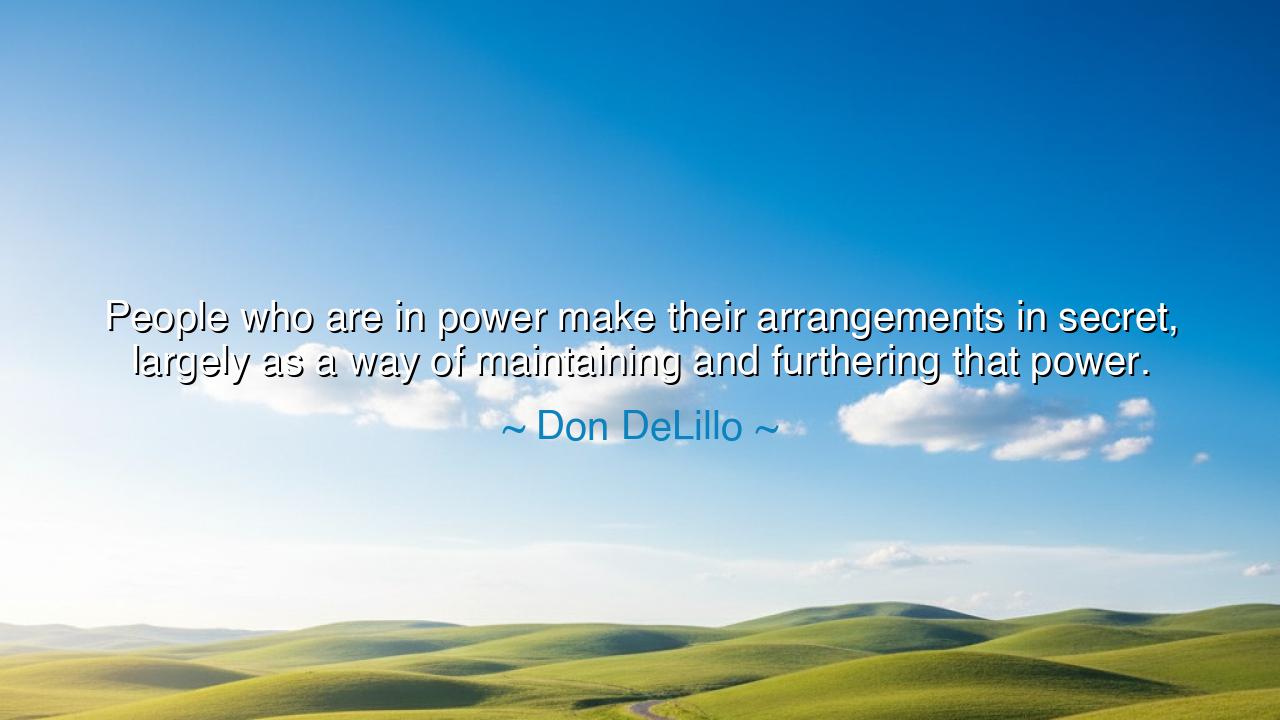
People who are in power make their arrangements in secret
People who are in power make their arrangements in secret, largely as a way of maintaining and furthering that power.






“People who are in power make their arrangements in secret, largely as a way of maintaining and furthering that power.” These words by Don DeLillo reveal a harsh truth about the nature of power: those who hold it often operate in shadows, making decisions away from the prying eyes of the public. DeLillo understands that the essence of power is control, and secrecy is a tool employed to preserve and expand that control. It is in the hidden corners of decision-making, where the public cannot see, that those in positions of authority strengthen their grip, manipulating the system to their advantage. In this truth lies a warning — that power is not always transparent, and those who wield it often do so with deliberate secrecy to ensure their reign continues.
The ancients were keenly aware of the dangers of unchecked power. In Plato's Republic, he spoke of the philosopher-king, a ruler who must have wisdom and integrity, knowing that power could easily be corrupted if not tempered by virtue. Yet, even Plato recognized that power often thrives in secrecy, as those who rule may not wish to expose their true motives or methods. The ancient world was rife with instances of rulers making secretive pacts or engaging in clandestine dealings to secure their power. Cicero, the Roman statesman, warned against the dangers of tyranny, knowing that secrecy and deception often accompanied those who sought to consolidate their influence over others.
Consider the example of Julius Caesar and his rise to power. In his quest for dominance, Caesar forged secret alliances and made covert agreements, such as the First Triumvirate with Pompey and Crassus. This secretive arrangement allowed him to secure his political position and eventually march into Rome as its uncontested ruler. His rise to power was marked not by open transparency, but by backroom deals and careful manipulation, underscoring DeLillo’s observation that those in power often act behind closed doors to protect their interests and fortify their hold over the people.
In modern history, Richard Nixon's involvement in the Watergate scandal provides a striking example of the manipulation of power in secrecy. The Nixon administration sought to maintain control through covert actions, including the illegal wiretapping of political opponents and the cover-up of its involvement. When these secretive actions were exposed, the public's trust in government was irrevocably damaged, demonstrating the peril of ruling in darkness. Nixon’s downfall was a direct result of the secretive dealings that he hoped would preserve his power, revealing the inherent dangers of operating outside the gaze of accountability.
DeLillo's words urge us to understand that power thrives on secrecy, yet this very secrecy often sows the seeds of its eventual undoing. When those who wield power operate in the shadows, they risk creating a system of corruption and mistrust. History teaches that the more secretive those in power become, the more fragile their hold. The eventual exposure of these secrets, whether through revelation or whistleblowing, leads to a breakdown in trust and the disillusionment of the people.
In conclusion, DeLillo's insight reminds us of the delicate relationship between power and secrecy. While power may be strengthened by covert dealings and behind-the-scenes arrangements, the price of such actions is often the erosion of trust and the eventual collapse of that power. The ancients warned us of this dynamic, and modern examples confirm it: true power cannot be sustained through secrecy alone, for the light of truth always exposes the darkness in which it is hidden.






NNDo Nhat Nam
I feel both intrigued and uneasy reading this. It suggests a natural tension between power and accountability. Are citizens or followers doomed to be unaware of decisions that affect them, and if so, how does that shape democracy and justice? I’m curious whether educating the public, enforcing checks and balances, or fostering whistleblower protections can mitigate the concentration of secretive decision-making, or whether secrecy is an inherent and unavoidable feature of influence.
KLkaka Linh
This quote sparks reflection on ethics and strategy. I’m curious whether secrecy in power is more about survival, advantage, or control. Could individuals in positions of power resist the inclination to manipulate behind closed doors, or is it an inevitable consequence of authority? I also wonder how technology, social media, and transparency initiatives influence the traditional dynamics of secrecy among powerful actors.
NHTrung Nguyen hoang
I find this statement thought-provoking because it touches on human behavior and organizational psychology. Does the tendency to act secretly stem more from fear of losing power or from the strategic nature of leadership? I wonder whether history shows consistent patterns where secrecy leads to consolidation of authority, and whether democratic or participatory structures can effectively counterbalance these instincts without compromising efficiency.
DTDat Thanh
Reading this, I feel both skeptical and concerned. It raises the question: are all secret arrangements inherently self-serving, or can some be for strategic or protective reasons? I’m curious how secrecy in power dynamics impacts ordinary citizens’ lives. Does this pattern explain systemic inequalities or manipulation? Could promoting transparency and civic oversight reduce abuses, or is some level of secrecy an unavoidable aspect of governance and organizational strategy?
ZZAP
This quote makes me reflect on transparency and accountability in leadership. Is it inevitable that those in power resort to secrecy to maintain control, or can openness coexist with influence? I wonder how secrecy shapes public trust and whether it fosters corruption or simply protects sensitive decision-making. Could society develop mechanisms that balance the need for confidentiality with the public’s right to know, ensuring power is exercised responsibly?